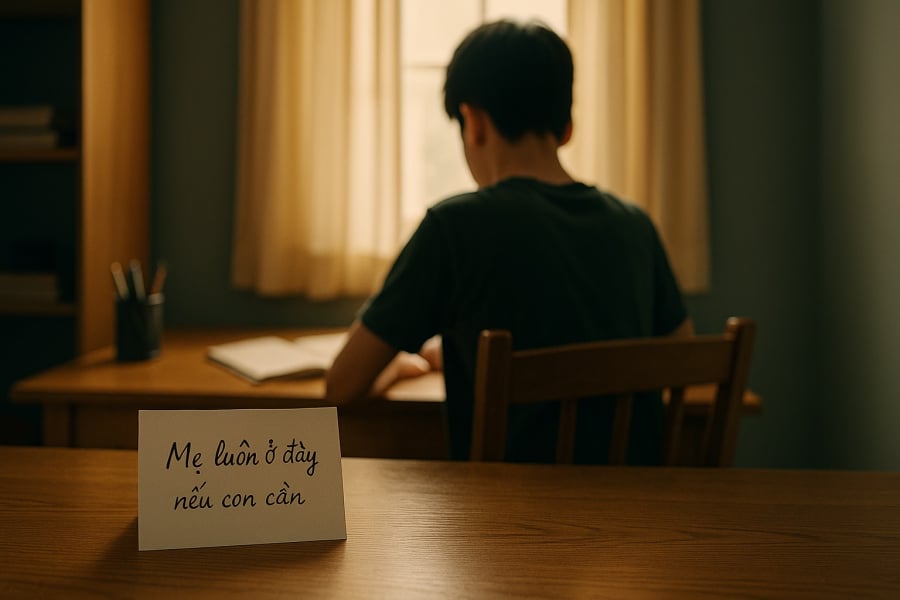## Puberty – A Fragile but Necessary Stage for Freedom
Puberty – a fragile but freedom-craving stage
Puberty is always a significant challenge for any parent. Once innocent, children now become stubborn, irritable, and prone to anger for no apparent reason. Many parents share that they feel like they are being “pushed out of their child’s world,” even though all they want is to protect their child every step of the way.
Ms. Huyen Trang, a resident of Ha Dong, Hanoi, and mother of a 14-year-old boy, shared, “There are times when my son remains silent for an entire day, giving monosyllabic answers to my questions. At first, I was very angry, but later I realized that he might need his own private space, something I had never considered before.”
According to psychologist Le Khanh, a lecturer at the University of Social Sciences and Humanities in Ho Chi Minh City, puberty is a period of significant brain and hormonal changes, leading to a stronger sense of self-expression in children, but also making them more vulnerable. “Children want to be trusted and to make some personal decisions on their own. If parents exert too much control, they may push their children further away,” she said, quoting a source from ZingNews.
The “Hidden Hug” Rule – When Care Needs to be Invisible
The term “Hidden Hug” is not found in any textbooks, but it is a concept practiced by many experienced parents. It is a style of loving that is not loud or imposing but is always present like an embrace ready to tighten its hold whenever the child desires.
A mother in Ho Chi Minh City, Ms. Kim Oanh, shared a heartwarming story on Vietnamnet about how she stopped checking her child’s phone every night. Instead, she left a small note on their desk: ‘I’m here if you need me.’ It took two weeks, but her child eventually texted back to thank her. From that point on, they started sharing more.
This silent approach provides a sense of security for the child—knowing that their parents are not judging or monitoring their every move but are still watching over them with loving eyes.

Respecting Differences – The Foundation of Connection
Many parents feel disheartened when their children stop obeying them as they used to. Instead of forcing them back into a “mold,” try taking a step back to understand that they are also learning to become their true selves.
Educational expert Nguyen Thi Kim Anh from Le Quy Don High School in Hanoi shared on Dan Tri, “Parents should shift their mindset from ‘teaching their children’ to ‘accompanying their children.’ Respecting their emotions and perspectives doesn’t mean letting go; it demonstrates trust in their ability to learn.”
Allowing children to make their own decisions—whether it’s choosing their clothes, friends, or extracurricular activities—is the first step toward building independence. But behind the scenes, parents’ “hidden hugs” are always there to support them when needed.
When Necessary, Don’t Hesitate to Express Your Love in Words
Ironically, as children grow up, parents tend to express their love less often. However, there’s a small paradox: the less you say it, the less they feel it. During puberty, children need to know that no matter how rebellious they may be, their parents’ love remains unchanged.
Ms. Ngoc Ha, a resident of Ecopark, shared how she started sending good morning messages to her child: “Wishing you a wonderful day ahead. Love, Mom.” At first, her child ignored them. But after a few weeks, one morning, her child left a small note on the table: “Mom, I have an exam today, and I’m a little nervous.”

Unraveling the Knot with Persistent Gentleness
Your child may not respond immediately, say thank you, or show their emotions. But like a quietly germinating seed, your patience as a parent will eventually blossom. The “Hidden Hug” rule is not a rigid formula but rather an adaptable, subtle, and patient expression of parental love.
“Parental love doesn’t have to be loud. It just needs to be enough for your child to know that no matter how far they roam, there will always be a place to return to,” quoted psychologist Nguyen Dieu Linh from VnExpress.
Conclusion
Puberty is a journey for both children and parents. If you feel disconnected from your child, try a new approach—one that is gentle, respectful, and patient. Because sometimes, the strongest embrace is one that doesn’t need to be tight.
































